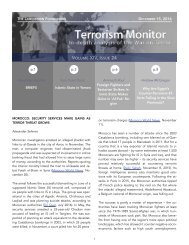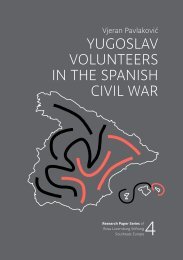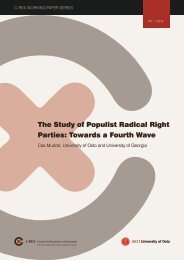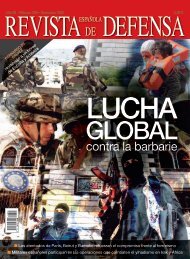SUMMARY
2016_classification_of_programmes_against_violent_islamist_extremism.pdf?utm_content=buffer41973&utm_medium=social&utm_source=twitter
2016_classification_of_programmes_against_violent_islamist_extremism.pdf?utm_content=buffer41973&utm_medium=social&utm_source=twitter
You also want an ePaper? Increase the reach of your titles
YUMPU automatically turns print PDFs into web optimized ePapers that Google loves.
In addition to addressing the strategies used to spread Islamism<br />
on the internet, focus is also placed on anti-Muslim movements<br />
led by right-wing extremists who make use of shocking depictions<br />
of jihadist violence and spread anti-Muslim positions in blogs and<br />
online forums.<br />
2.1.2. ED UCATI ON WORK<br />
A total of 14 of 36 initiatives listed education work as a key element<br />
in preventing the start of the radicalisation process. The<br />
common element here is the dissemination and processing of information<br />
and knowledge on general topics (religion, culture, radicalisation,<br />
etc.) or the needs of adolescents and young adults.<br />
In general, two basic orientations can be identified: 1. Pure information<br />
campaigns and 2. Information campaigns being that are<br />
linked to further education.<br />
2.1.2.1. INFOR MAT ION CA MPA I G NS<br />
The format of the information campaigns, of which there are four<br />
such initiatives in the period being analysed, focuses on providing<br />
information and knowledge to children, adolescents and young<br />
adults aged between 7 and 29. Relatives and other interested parties,<br />
primarily those associated with the school, are also included<br />
here.<br />
Content is considered relevant if it reveals the general orientation<br />
and background analysis. In this way, religious and democratic political<br />
standpoints are discussed, while the radicalisation process<br />
and violence in general are examined; in addition, awareness is<br />
raised concerning youth-specific needs for an effective strategy of<br />
prevention.<br />
One of the goals is to develop social affiliation and a sense of belonging<br />
in a pluralistic society.<br />
The dialogue events, the production of information materials and<br />
hand-outs, and class activities at school or project(day)/workshops,<br />
such as those held as part of the “Schule<br />
ohne Rassismus – Schule mit Courage” [Schools without Racism –<br />
6








